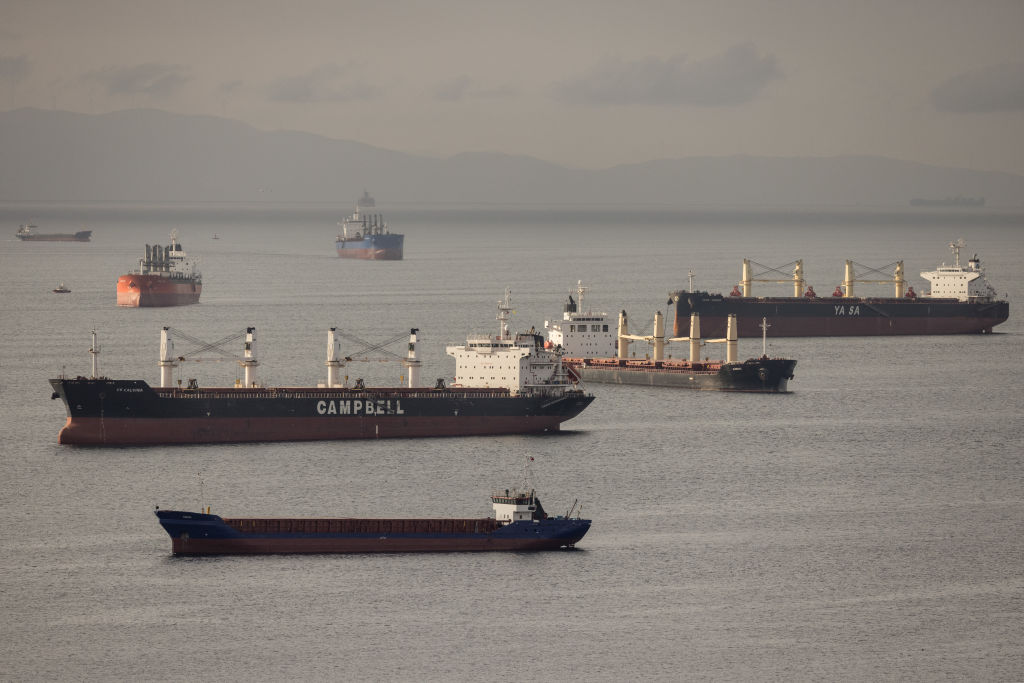Crucial Ukrainian grain export deal extended despite disagreement


A free daily email with the biggest news stories of the day – and the best features from TheWeek.com
You are now subscribed
Your newsletter sign-up was successful
Ukraine and Russia agreed on Saturday to extend a crucial deal allowing Ukrainian grain exports safe passage through the Black Sea, though the terms of the extension were disputed by the two countries.
Known as the Black Sea Grain Initiative, the extension was announced by the United Nations in collaboration with Turkish President Recep Tayyip Erdogan, whose country helped broker the deal. The initiative is a key agenda to help combat worldwide hunger, as it allows for the "safe navigation for the exports of grain and related foodstuffs and fertilizers, including ammonia, from designated Ukrainian seaports," the U.N. said.
More than 25 million metric tons of food have been moved around the world to help combat the global food shortage since the initiative began, the U.N. added.
The Week
Escape your echo chamber. Get the facts behind the news, plus analysis from multiple perspectives.

Sign up for The Week's Free Newsletters
From our morning news briefing to a weekly Good News Newsletter, get the best of The Week delivered directly to your inbox.
From our morning news briefing to a weekly Good News Newsletter, get the best of The Week delivered directly to your inbox.
However, like most things between Ukraine and Russia, the details of the extension were fraught and tension-filled. While Ukrainian Deputy Prime Minister Oleksandr Kubrakov insisted the deal had been extended for 120 days, Russian Foreign Ministry officials told Russian news agency Tass that the extension was only agreed to for 60 days.
Neither the U.N. nor Erdogan confirmed the length of the extension in their announcement, and BBC News noted that "Russia has warned it will not allow the deal to go on longer unless sanctions against Moscow are softened."
The Black Sea Grain Initiative was first agreed to in July 2022 as part of a global collaborative effort. Amidst growing tensions towards the end of 2022, a last-minute extension was agreed to for another 120 days that November to bring the deal into 2023.
Russia had previously walked back any talks of an extension, but agreed to table a deal after international condemnation, with President Biden calling the decision "purely outrageous" and a move that would "increase starvation."
A free daily email with the biggest news stories of the day – and the best features from TheWeek.com
Justin Klawans has worked as a staff writer at The Week since 2022. He began his career covering local news before joining Newsweek as a breaking news reporter, where he wrote about politics, national and global affairs, business, crime, sports, film, television and other news. Justin has also freelanced for outlets including Collider and United Press International.
-
 How the FCC’s ‘equal time’ rule works
How the FCC’s ‘equal time’ rule worksIn the Spotlight The law is at the heart of the Colbert-CBS conflict
-
 What is the endgame in the DHS shutdown?
What is the endgame in the DHS shutdown?Today’s Big Question Democrats want to rein in ICE’s immigration crackdown
-
 ‘Poor time management isn’t just an inconvenience’
‘Poor time management isn’t just an inconvenience’Instant Opinion Opinion, comment and editorials of the day
-
 What is ‘Arctic Sentry’ and will it deter Russia and China?
What is ‘Arctic Sentry’ and will it deter Russia and China?Today’s Big Question Nato considers joint operation and intelligence sharing in Arctic region, in face of Trump’s threats to seize Greenland for ‘protection’
-
 What would a UK deployment to Ukraine look like?
What would a UK deployment to Ukraine look like?Today's Big Question Security agreement commits British and French forces in event of ceasefire
-
 Would Europe defend Greenland from US aggression?
Would Europe defend Greenland from US aggression?Today’s Big Question ‘Mildness’ of EU pushback against Trump provocation ‘illustrates the bind Europe finds itself in’
-
 Did Trump just end the US-Europe alliance?
Did Trump just end the US-Europe alliance?Today's Big Question New US national security policy drops ‘grenade’ on Europe and should serve as ‘the mother of all wake-up calls’
-
 Is conscription the answer to Europe’s security woes?
Is conscription the answer to Europe’s security woes?Today's Big Question How best to boost troop numbers to deal with Russian threat is ‘prompting fierce and soul-searching debates’
-
 Trump peace deal: an offer Zelenskyy can’t refuse?
Trump peace deal: an offer Zelenskyy can’t refuse?Today’s Big Question ‘Unpalatable’ US plan may strengthen embattled Ukrainian president at home
-
 Vladimir Putin’s ‘nuclear tsunami’ missile
Vladimir Putin’s ‘nuclear tsunami’ missileThe Explainer Russian president has boasted that there is no way to intercept the new weapon
-
 The Baltic ‘bog belt’ plan to protect Europe from Russia
The Baltic ‘bog belt’ plan to protect Europe from RussiaUnder the Radar Reviving lost wetland on Nato’s eastern flank would fuse ‘two European priorities that increasingly compete for attention and funding: defence and climate’
